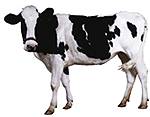
THURSDAY, July 12 (HealthDay News) — Rising temperatures caused by climate change may lead to reduced milk production among cows in the southern United States, a new study suggests.
University of Washington researchers analyzed climate and dairy industry data and concluded that the effects of climate change on milk production by Holstein cows through 2080 will vary across the United States due to major regional differences in humidity and swings between day and night temperatures.
For example, the humidity and hot nights in the Southeast make that region the most unfriendly place in the United States for dairy cows, the study authors said in a university news release.
The study concluded that “regions that are currently experiencing the greatest losses [in milk production] are also the most susceptible: They are projected to be impacted the most by climate change.”
Study author Yoram Bauman summed up the findings this way: “Cows are happy in parts of Northern California and not in Florida.”
The researchers also found that dairy farmers are already clustering in areas of the country that are most comfortable for cows, such as the cool coastal counties of Washington state.
“Using U.S. Department of Agriculture statistics, if you look at milk production in the Southeast versus the Northwest, it’s very different,” study co-author and postdoctoral researcher in the university’s Climate Impacts Group, Guillaume Mauger, said in the news release. “It’s reasonable to assume that some of that is due to the inhospitable environment for cows in the Southeast.”
The study was scheduled for presentation Thursday at the Conference on Climate Change at the University of Washington, in Seattle. The data and conclusions of research presented at meetings should be viewed as preliminary until published in a peer-reviewed journal.
More information
The World Health Organization outlines the effects of climate change on human health.

